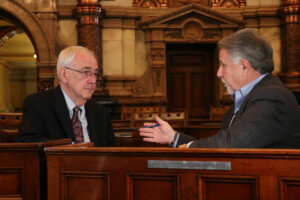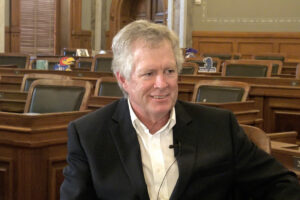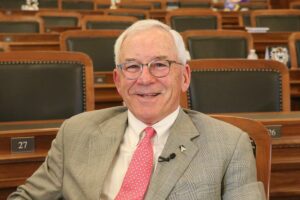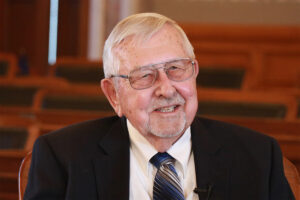Search Results

Interview of Bruce Larkin, April 12, 2024
Interviewed by Chris Courtwright
Larkin's interview focuses extensively on his involvement with tax issues during his 20-year tenure in the legislature, and after, at the Board of Tax Appeals (BOTA). He tells lots of funny stories in the interview, particularly about legislative strategy. Larkin got interested in the legislature because of the American Agriculture movement in the mid-1980's. He joined the Department of Revenue's Use Value Advisory Group at a time when appraising farm ground was difficult. Larkin was a small family farmer who farmed ground that his great grandfather had bought in 1878. Larkin was also interested in education; Show Moreparticularly how small rural communities were faring under the school finance formula. But his consistent interest was in taxation. He was involved in almost every tax issue that surfaced during his 20-year involvement with the legislature, and afterward, as a staff member at the Kansas Department of Revenue or on the Court of Tax Appeal as a judge or as Chief Judge. His discussion of issues surrounding classification and appraisal is very informative. He described changes in the use value appraisal of agricultural land.
Interviews with many of the people mentioned in this interview can be found on this website by using the Search box, or by going to the Statehouse Conversations Collection. Show Less

Interview of Tim Emert, October 4, 2019
Interviewed by Jim McLean
Tim Emert's interview covers his Senate career in the last decade of the Twentieth century, following passage of a markedly different school finance bill in 1992 and with a divided Republican caucus in the Senate--a time of big change. Emert stepped into the chairmanship of the Senate Judiciary committee immediately and later moved up to Majority Leader by a one-vote margin. The interview is filled with descriptions of coalitions he formed to get legislation passed. As Judiciary chair Emert dealt with both the death penalty, which he personally opposed, and a bill restricting late term abortions which Show Moreno one liked but passed. He worked with Christine Downey to get a major policy change regarding community colleges. There are also descriptions of his work on the State Board of Education and later, the Board of Regents. Emert describes himself as neither moderate or conservative, but "a realistic Republican." As Majority Leader he talks about the "juggling act" trying to keep communication with the conservative House Speakers (Shallenburger and Jennison) and the Senate. He explains the tension in having both the poorest and richest counties in his district and trying to provide equalization of school funding. The interview touches on the renovation of the Capitol and also renovation of Cedar Crest. Show Less

Interview of Dennis McKinney, August 23, 2019
Interviewed by Dale Goter
Dennis McKinney developed many insights in his sixteen years as a leader in the minority party into how the legislature did work, and how it should work. He recounts numerous instances when things worked well because of bipartisan cooperation and compromise. McKinney's experiences on the House Energy and Natural Resources committee working with Carl Holmes and Ken Grotewiel helped shape water policy in Kansas. His experience as a farmer and rancher in south central Kansas coupled with his focus on problem solving led to his reputation as a "middle of the road legislator" who would work Show Morewith both political sides as well as urban and rural. McKinney was committed to public education as well as conservation. The pursuit of fair and balanced tax policy shaped his actions. The interview highlights the importance of leadership from the governor's office and other legislative leaders (Mays, Shallenburger, D. Kerr, Morris). There is an interesting segment about the 2005 Special Session on school finance where McKinney talks about using the courts as leverage. The interview concludes with a brief discussion of the Greensburg tornado. Show Less

Interview of Donna Whiteman, January 19, 2018
Interviewed by H. Edward (Ed) Flentje
Former Representative Donna Whiteman's 2018 oral history interview provides detail about how the legislature functioned from 1983-1991. She describes the culture as less demonizing, more collegial and civil than is generally assumed by the public. Whiteman rose to a leadership position fairly quickly and became Majority Leader when the Democrats gained the majority in the House in 1991. One of Whiteman's assigned roles was to work with a group of Republicans called "The Rebels" - seven to nine members who would vote with the Democrats on certain bills. Whiteman also describes in some detail her Show Moreexperiences as a member of Governor Joan Finney's cabinet, particularly on issues such as foster care, long term care, and children and families. She observes that "after all the struggling in the 1991 session, the 1992 session is the shining star of progressive activity" and that the Children's Initiative produced visible, tangible, and beneficial legislation.
A version of this interview is also posted on KansasMemory.org, the website of the Kansas Historical Society. Show Less

Interview of Mike O'Neal, April 16, 2021
Interviewed by Alan Conroy
Former Speaker Mike O'Neal's interview covers his 28 years in the Kansas House and his impact as Chair of the House Judiciary Committee on the Kansas legal system, both criminal and civil. In fact, O'Neal chaired the House Judiciary Committee three different times totaling 13 years and also served as Chairman of the House Education Committee and a redistricting committee in 2002. He has been involved with workers compensation issues and medical malpractice. O'Neal explains his own evolution in thinking as he, and his constituents, became more conservative. He candidly discusses his race for Speaker of the Show MoreHouse and compares the leadership styles of other speakers with whom he served. O'Neal left the House in 2012 after finishing his second term as Speaker to take a position with the Kansas Chamber of Commerce as its chief executive officer. After four years with the Kansas Chamber he retired to open his own legal consulting and governmental relations firm, O'Neal Consulting, LLC. Show Less

Interview of Jack Wempe, September 28, 2021
Interviewed by Alan Conroy
Jack Wempe of Rice County gave a detailed interview about the decade of the 1990's he spent in the Kansas House of Representatives. He played pivotal roles in the passage of the 1992 school finance bill and legislation to consolidate governance in higher education. He worked with members of both parties to pass legislation important to rural communities as well as education. Wempe became interested in taxation and economic development. Wempe also comments on the shift in philosophy of the Republican party during his time in office and its move to a more conservative leadership. Show MoreAt the conclusion of his legislative service, Wempe was appointed to the Board of Regents where he became chair in 2003. Show Less

Interview of Ed McKechnie, February 9, 2024
Interviewed by Chris Courtwright
This lengthy and wide-ranging interview is full of interesting stories about how the legislature worked when its leaders realized the House Democrats were in the majority by one vote (1990 election) with a new Democratic governor. The 1991-92 session was historic because of the major changes in property taxes and school finance. McKechnie built relationships across the aisle which helped him accomplish things and pass legislation. His interview is replete with descriptions of legislators with whom he worked. McKechnie served on the Kansas Bioscience Authority and after its demise, on the Kansas Board of Regents. Show More He discussed the transition of the University of Kansas Hospital to being designated a major cancer center. One particularly interesting story for football fans is about the major conference realignment that occurred from 2011 to 2012. He described in detail the negotiations over which university would stay or leave the Big XII. Ordinarily the Regents would not have been involved, but the impact of these decisions was too great to ignore. McKechnie also talks about the decisions the Regents made about raising tuition.
Highlights -- short excerpts from the interview
